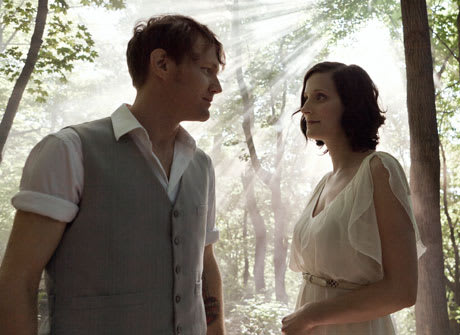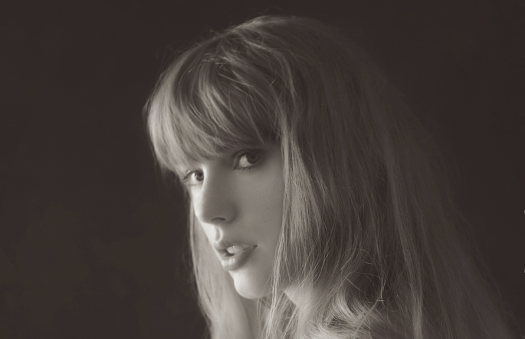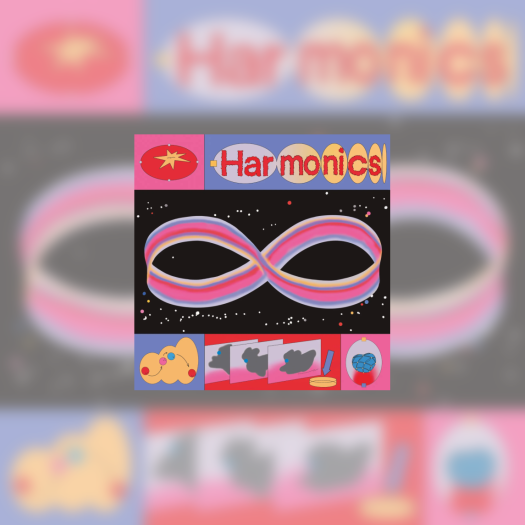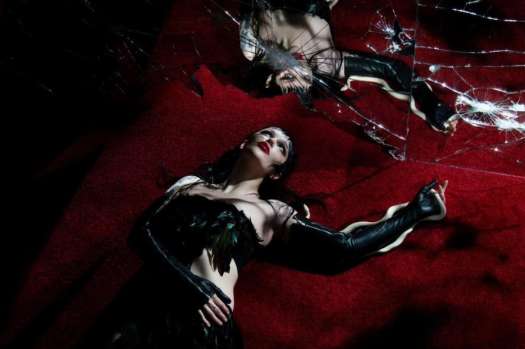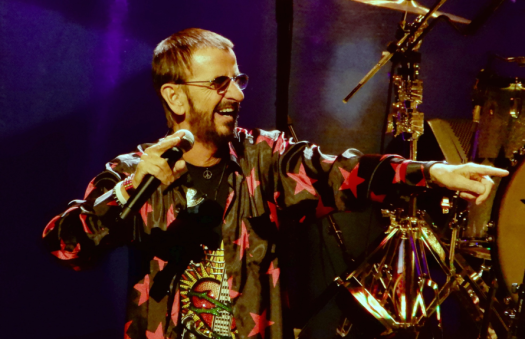Arguably the first couple of Canadian roots music, Luke Doucet and Melissa McClelland have toured and recorded together extensively over the last six years. In new project Whitehorse, they make this musical marriage official, consummating it with this eight-song, 24-minute mini-album. It includes seamless revisions of two tracks they have previously recorded individually. "Broken" and "Passenger 24" are two of the strongest tunes in the catalogues of, respectively, Doucet and McClelland. His big, resonant guitar sound, one of the most recognizable in Canadian music, adds muscle to the latter, while "Broken" is similarly invigorated by her strong harmony vocals. The trading of vocal parts works well on Springsteen classic "I'm On Fire." New jointly written originals include the dramatic "Killing Time is Murder" and dreamily poetic "Night Owls," while the album begins and ends with the short and avant-garde-ish two-part "Eulogy for Whiskers." Something of a grab bag, Whitehorse remains an attractive teaser for what is surely much more to come.
Was it important to have a band name for your new project?
McClelland: We have spent years getting our names out there, so we initially weren't going to turn our backs on that. But it got to the point where it was, "we need a band name."
Doucet: We have a more definable sound as Whitehorse than individually. There is chemistry ― an artistic union does produce something larger than the sum of its parts. We have often gone out on the road as a duo act, trading songs back and forth, singing harmonies, but now we are a band.
McClelland: And it is more than trading songs back and forth; it will be about both being involved in every song the entire set. We have done the duo show, and it is way more casual. We really want to focus on the fact that this is a band.
Doucet: Being a singer-songwriter can be horribly tedious, boring and artless in a lot of ways. The solitary, introspective, navel-gazing type of singer-songwriter is so cliché. We murdered the singer-songwriter in each of us to be Whitehorse.
The album is something of a hybrid, with old and new songs and a cover.
Doucet: This record is about introducing Whitehorse as a band, as an entity and as a musical marriage.
McClelland: It is also about bringing our two fan bases together. There is a lot of overlap already, but we thought bringing some of the old material and putting it in a new light would be a good way of introducing this new band.
Doucet: There is not a lot of rock'n'roll in Whitehorse at this point, nor retro country ballads ― they probably will not be a part of Whitehorse. It is the common ground we share that will define what Whitehorse are. It made sense to find songs from each other we have both been a big part of.
McClelland: One thing we share as artists and writers is that we are all over the map stylistically. We both have trouble sticking to one thing. That can work against you. When we came together, we found the thing that works; it is more focused.
Doucet: Whitehorse have more of a sound than either of our solo careers ever have had.
Any role models or inspirations for being a couple making music together?
McClelland: Johnny Cash and June Carter Cash have that epic musical love story. There is something very beautiful about that. That final video Johnny Cash made brings me to tears every time I see it. Such a beautiful final mark, and there's the legacy of that marriage. There's something not very rock'n'roll about growing old together, but when you see that, you can't deny the romance.
Doucet: In forging this project, we were listening to a lot of Gram [Parsons] and Emmylou [Harris], actually. Being a couple and making music together, there's a relatively small amount of couples doing that, so comparisons are inevitable. Gram and Emmylou definitely hit close to home. The comparisons are interesting. He's seen as a country-rocker, and I've been accused of that. She's a wonderful singer and so is Melissa. Gram's rather a shitty singer; I'm kind of a shitty singer. I love his warbly, shitty singing. There are a lot of parallels that work. He was a closet Rolling Stone. So am I. She was something of a beautiful country diva, and you could say that about Melissa. The beauty and the beast duality in that relationship I love, and I feel that in ours. It is the tension and the release in the music too, the darkness and the beauty.
How will Whitehorse work live?
Doucet: We're rehearsing at home and we'll do some rehearsal gigs in Hamilton and Waterloo. We'll be using a lot of loops and instruments, not just the two of us on guitars ― there'll be drums. If we do it well, it will be something that has never been done, though I might be talking out my ass.
McClelland: We want to build a show that is out of the singer-songwriter realm of just passing a guitar back and forth.
Doucet: There is a fine line between being ambitious and somewhat revolutionary in how you present music and being sort of self-righteous and pretentious. We are going to take some risks in how we present the songs. I was talking to Owen Pallett at a festival recently about the way he builds music, using certain kinds of loops. I've done that a bit with the guitar, back in the Aloha, Manitoba days, and I remember seeing Hawksley Workman and Danny Michel doing looping stuff, and Tamara Williamson. She was the first person I saw do that really well. When I saw lots of other people doing it I stopped, saying, "that's a cop-out." We are doing it in a way that is not a cop-out. We'll have drums, keyboards and bass.
Even before the record is out, shows on your upcoming tour are selling out. Is that gratifying?
McClelland: Yes it is. People want to see us together and that is reassuring, for us. Obviously we'll have fans on both sides that might prefer to see us on our own, but for the most part, people are excited and are supporting us. It has come together so naturally as a musical act; it just makes sense. When we tour separately, a lot of people are disappointed, as they want to see the other person too.
Doucet: The part that excites me the most is that if we do this right they are going to see a show they've never seen before. Some may think we're going to swap songs back and forth like a folk duo, but that is not the case at all. I can't wait for what is going to happen. It was very important when we started this that it would not be just a folk duo.
McClelland: We want to step it up. Take it one step further.
Doucet: If we can garner this much excitement before the band really exist, imagine what they are going to think when they see what it really is.
How do you see the future of Whitehorse?
Doucet: I think the sky's the limit. This record is coming out now and I know we have a double album's worth of material ready to release as soon as it makes sense. I'd love to push things as far as they can go. I can put out a next record as close to my heart as anything I've ever done before, and for the first time in my life I have the opportunity for the beauty element to be breathtaking, because I can go, "Melissa, you sing this one." Whereas before, it's this limited vocal thing I've had to deal with, and that defines how it goes.
How about people awaiting the next Luke Doucet and Melissa McClelland solo albums?
Doucet: They are going to be waiting a long time. This is not a side-project.
McClelland: This is our focus. We could quite possibly have solo records within the next five years, but right now this is the main thing for both of us. We're not leaving anything behind. These are our songs. We're not eliminating anything.
You've been able to integrate your careers well, touring in each other's bands and together in Sarah McLachlan's group
McClelland: Touring with Sarah is a cushy tour experience; we don't have to lift a finger and we get room service every night. Very relaxed, no pressure and we get paid well; it is inspiring and fun. We leave that and the reality of our tours is quite different. It's a bus tour, then a van tour. I like the fact that things change so frequently in our lives. Not to say we aren't often humbled on the road. There are really hard days and shows, tough moments where we're lugging loads of gear through train stations, arguing over which direction we are supposed to be going. But I think we thrive on all of it.
Doucet: The great majority of touring musicians are leaving someone behind. The romance of being a touring artist is tempered by something that is missing. The road can be very lonely, unless you're Mötley Crüe! We have managed to strike a crazy, unlikely balance where it all kind of works. The different wheels in the machinery are all spinning in a really synchronistic way. We've been married five years and I was on the road almost 15 years before that. Touring is bittersweet if someone you care about is not out there with you. Essentially we are getting away with murder. I always liken it to a waiter in a French restaurant on a unicycle balancing 19 plates. It's like, "oh my god, I can't believe I'm doing this." And I've had this crazy balancing act for five years and we're getting away with it. Every day we don't drop a plate feels incredible.
(Six Shooter)Was it important to have a band name for your new project?
McClelland: We have spent years getting our names out there, so we initially weren't going to turn our backs on that. But it got to the point where it was, "we need a band name."
Doucet: We have a more definable sound as Whitehorse than individually. There is chemistry ― an artistic union does produce something larger than the sum of its parts. We have often gone out on the road as a duo act, trading songs back and forth, singing harmonies, but now we are a band.
McClelland: And it is more than trading songs back and forth; it will be about both being involved in every song the entire set. We have done the duo show, and it is way more casual. We really want to focus on the fact that this is a band.
Doucet: Being a singer-songwriter can be horribly tedious, boring and artless in a lot of ways. The solitary, introspective, navel-gazing type of singer-songwriter is so cliché. We murdered the singer-songwriter in each of us to be Whitehorse.
The album is something of a hybrid, with old and new songs and a cover.
Doucet: This record is about introducing Whitehorse as a band, as an entity and as a musical marriage.
McClelland: It is also about bringing our two fan bases together. There is a lot of overlap already, but we thought bringing some of the old material and putting it in a new light would be a good way of introducing this new band.
Doucet: There is not a lot of rock'n'roll in Whitehorse at this point, nor retro country ballads ― they probably will not be a part of Whitehorse. It is the common ground we share that will define what Whitehorse are. It made sense to find songs from each other we have both been a big part of.
McClelland: One thing we share as artists and writers is that we are all over the map stylistically. We both have trouble sticking to one thing. That can work against you. When we came together, we found the thing that works; it is more focused.
Doucet: Whitehorse have more of a sound than either of our solo careers ever have had.
Any role models or inspirations for being a couple making music together?
McClelland: Johnny Cash and June Carter Cash have that epic musical love story. There is something very beautiful about that. That final video Johnny Cash made brings me to tears every time I see it. Such a beautiful final mark, and there's the legacy of that marriage. There's something not very rock'n'roll about growing old together, but when you see that, you can't deny the romance.
Doucet: In forging this project, we were listening to a lot of Gram [Parsons] and Emmylou [Harris], actually. Being a couple and making music together, there's a relatively small amount of couples doing that, so comparisons are inevitable. Gram and Emmylou definitely hit close to home. The comparisons are interesting. He's seen as a country-rocker, and I've been accused of that. She's a wonderful singer and so is Melissa. Gram's rather a shitty singer; I'm kind of a shitty singer. I love his warbly, shitty singing. There are a lot of parallels that work. He was a closet Rolling Stone. So am I. She was something of a beautiful country diva, and you could say that about Melissa. The beauty and the beast duality in that relationship I love, and I feel that in ours. It is the tension and the release in the music too, the darkness and the beauty.
How will Whitehorse work live?
Doucet: We're rehearsing at home and we'll do some rehearsal gigs in Hamilton and Waterloo. We'll be using a lot of loops and instruments, not just the two of us on guitars ― there'll be drums. If we do it well, it will be something that has never been done, though I might be talking out my ass.
McClelland: We want to build a show that is out of the singer-songwriter realm of just passing a guitar back and forth.
Doucet: There is a fine line between being ambitious and somewhat revolutionary in how you present music and being sort of self-righteous and pretentious. We are going to take some risks in how we present the songs. I was talking to Owen Pallett at a festival recently about the way he builds music, using certain kinds of loops. I've done that a bit with the guitar, back in the Aloha, Manitoba days, and I remember seeing Hawksley Workman and Danny Michel doing looping stuff, and Tamara Williamson. She was the first person I saw do that really well. When I saw lots of other people doing it I stopped, saying, "that's a cop-out." We are doing it in a way that is not a cop-out. We'll have drums, keyboards and bass.
Even before the record is out, shows on your upcoming tour are selling out. Is that gratifying?
McClelland: Yes it is. People want to see us together and that is reassuring, for us. Obviously we'll have fans on both sides that might prefer to see us on our own, but for the most part, people are excited and are supporting us. It has come together so naturally as a musical act; it just makes sense. When we tour separately, a lot of people are disappointed, as they want to see the other person too.
Doucet: The part that excites me the most is that if we do this right they are going to see a show they've never seen before. Some may think we're going to swap songs back and forth like a folk duo, but that is not the case at all. I can't wait for what is going to happen. It was very important when we started this that it would not be just a folk duo.
McClelland: We want to step it up. Take it one step further.
Doucet: If we can garner this much excitement before the band really exist, imagine what they are going to think when they see what it really is.
How do you see the future of Whitehorse?
Doucet: I think the sky's the limit. This record is coming out now and I know we have a double album's worth of material ready to release as soon as it makes sense. I'd love to push things as far as they can go. I can put out a next record as close to my heart as anything I've ever done before, and for the first time in my life I have the opportunity for the beauty element to be breathtaking, because I can go, "Melissa, you sing this one." Whereas before, it's this limited vocal thing I've had to deal with, and that defines how it goes.
How about people awaiting the next Luke Doucet and Melissa McClelland solo albums?
Doucet: They are going to be waiting a long time. This is not a side-project.
McClelland: This is our focus. We could quite possibly have solo records within the next five years, but right now this is the main thing for both of us. We're not leaving anything behind. These are our songs. We're not eliminating anything.
You've been able to integrate your careers well, touring in each other's bands and together in Sarah McLachlan's group
McClelland: Touring with Sarah is a cushy tour experience; we don't have to lift a finger and we get room service every night. Very relaxed, no pressure and we get paid well; it is inspiring and fun. We leave that and the reality of our tours is quite different. It's a bus tour, then a van tour. I like the fact that things change so frequently in our lives. Not to say we aren't often humbled on the road. There are really hard days and shows, tough moments where we're lugging loads of gear through train stations, arguing over which direction we are supposed to be going. But I think we thrive on all of it.
Doucet: The great majority of touring musicians are leaving someone behind. The romance of being a touring artist is tempered by something that is missing. The road can be very lonely, unless you're Mötley Crüe! We have managed to strike a crazy, unlikely balance where it all kind of works. The different wheels in the machinery are all spinning in a really synchronistic way. We've been married five years and I was on the road almost 15 years before that. Touring is bittersweet if someone you care about is not out there with you. Essentially we are getting away with murder. I always liken it to a waiter in a French restaurant on a unicycle balancing 19 plates. It's like, "oh my god, I can't believe I'm doing this." And I've had this crazy balancing act for five years and we're getting away with it. Every day we don't drop a plate feels incredible.
